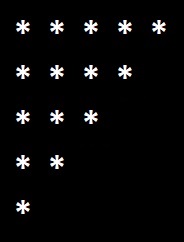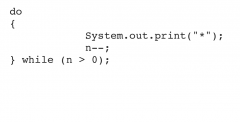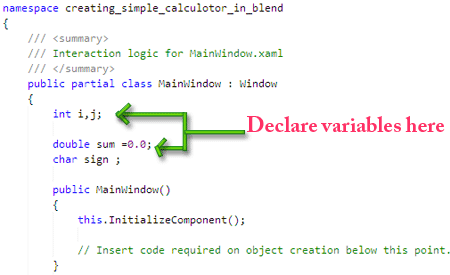c asterisk before variable
- 8 avril 2023
- slime tutorials not bootlegs
- 0 Comments
250 Why is the asterisk before the variable name, rather than after the type? Again, arrays throw a bit of a monkey wrench into the works, but we'll deal with the normal cases first. I've seen mixed versions of this in a lot of code. This one works with any "problematic type", for example arrays and references: I'd go for int* i; since the first part denotes the variable type (pointer to int), while the second part denotes the name (i). Okay, now what does the following line actually mean: It means that a is a pointer to an int value. Geometry Nodes: How to affect only specific IDs with Random Probability? Plagiarism flag and moderator tooling has launched to Stack Overflow! Ok, looks like your post got editted double foo[4]; So in essence, for each basic type, we also have a corresponding pointer type. @v.odd that argument is what I summarized as "the int *a way better reflects the syntactical structure" :) however the purpose of writing good code is not to somehow imitate the grammar used in the Standard. i think that i used & because the name (ampersand) The C standard only defines two meanings to the * operator: And indirection is just a single meaning, there is no extra meaning for declaring a pointer, there is just indirection, which is what the dereference operation does, it performs an indirect access, so also within a statement like int *a; this is an indirect access (* means indirect access) and thus the second statement above is much closer to the standard than the first one is. To create a pointer variable, we simply define a variable with a pointer type: int main() { int x { 5 }; int& ref { x }; int* ptr; return 0; } Note that this asterisk is part of the Want to improve this question? +1. I avoid declaring multiple variables in one statement due to the resulting visual ambiguity (int* i, j). What is the int?
What does the exclamation mark do before the function?  What is the historical reason why Python uses the double underscore for Class Private members. What is your favorite method to declare a pointer? We simply assign them. Because memory is a linear array, it is possible to interpret the value in a cell as an index in this array, and BCPL supplies an operator for this purpose. Connect and share knowledge within a single location that is structured and easy to search. It's a matter of preference, and somewhat of a holy war, just like brace style. Pointers in C: when to use the ampersand and the asterisk? Now you can do, if(*ptr == 'H') { What is the difference between 'typedef' and 'using' in C++11? @PEMapModder, that's just the return type of the function, in this case a pointer to. When you want to read or write the value in a pointer, use *. Well, B didn't use all the characters. Well because Python 2 uses .
What is the historical reason why Python uses the double underscore for Class Private members. What is your favorite method to declare a pointer? We simply assign them. Because memory is a linear array, it is possible to interpret the value in a cell as an index in this array, and BCPL supplies an operator for this purpose. Connect and share knowledge within a single location that is structured and easy to search. It's a matter of preference, and somewhat of a holy war, just like brace style. Pointers in C: when to use the ampersand and the asterisk? Now you can do, if(*ptr == 'H') { What is the difference between 'typedef' and 'using' in C++11? @PEMapModder, that's just the return type of the function, in this case a pointer to. When you want to read or write the value in a pointer, use *. Well, B didn't use all the characters. Well because Python 2 uses .
@Billy: If so, I've never seen that confusion in 12 years of trying to understand, parse, and explain standardese. Improving the copy in the close modal and post notices - 2023 edition. By clicking Accept all cookies, you agree Stack Exchange can store cookies on your device and disclose information in accordance with our Cookie Policy. int *i parses as int(*(i)) and is interpreted as i has type pointer-to integer. If you want more than just theoretical understanding I suggest to follow this Asking for help, clarification, or responding to other answers. Thus, when you call a function with an array expression as an argument, the function will receive a pointer, not an array: This is why you don't use the & operator for arguments corresponding to "%s" in scanf(): Because of the implicit conversion, scanf() receives a char * value that points to the beginning of the str array. You have pointers and values: int* p; // variable p is pointer to integer type Why is my multimeter not measuring current? One would have to ask Ken Thompson about why that choice was made. The asterisk (*) has two distinct meanings within C in relation to pointers, depending on where it's used. Well, BCPL was a bit wordy. Consider, "it may seem obvious that both are of type int*" Not so obvious, this is a naive argument. Is there a poetic term for breaking up a phrase, rather than a word? I've seen it this way too; however, I never liked the commonly repeated rationale. Given the two excellent answers in this question, including one with an answer directly from the language designer, it's hard to really justify the close as "opinion-based". But there is one other way you can use the stars and that is for variable unpacking. Function pointers in C need to be declared with an asterisk symbol and function parameters (same as the function they will point to) before using them in the program. By clicking Accept all cookies, you agree Stack Exchange can store cookies on your device and disclose information in accordance with our Cookie Policy. One way to look at it, is that the variable in your source/code, say, Makes the 'int a' refer to a value in memory, 0. The best way to have a pointer to several methods - critique requested. Probably gonna get much more info getting it first hand from a book, and the K&R explanation is quite clear. Making statements based on opinion; back them up with references or personal experience. Why is China worried about population decline? Of course, the well-known behavior comes in, when trying to define multiple pointers on one line (namely, the asterisk need to be put before each variable name to declare a pointer), but I simply don't declare pointers this way. It doesn't matter, it is personal preference. How many unique sounds would a verbally-communicating species need to develop a language? How can a person kill a giant ape without using a weapon? As I use C#, it handles types in a more intuitive way than C, so there is no problem declaring several pointers in the same statement: I prefer int* i (C++-style). You can entirely sidestep this by declaring one variable per line, which is never ambiguous: The balance between clear code and concise code is hard to strike a dozen redundant lines of int a; isn't good either. And thus ! This is a great answer, @MichaelT! Critical issues have been reported with the following SDK versions: com.google.android.gms:play-services-safetynet:17.0.0, Flutter Dart - get localized country name from country code, navigatorState is null when using pushNamed Navigation onGenerateRoutes of GetMaterialPage, Android Sdk manager not found- Flutter doctor error, Flutter Laravel Push Notification without using any third party like(firebase,onesignal..etc), How to change the color of ElevatedButton when entering text in TextField. K&R considered this to be a (positive) feature, not a design flaw. I think putting the asterisk adjacent to the name of the variable is clearer. Identification of the dagger/mini sword which has been in my family for as long as I can remember (and I am 80 years old).
Need sufficiently nuanced translation of whole thing, using wait (bash posix) and fail if one process fails in a script. By clicking Post Your Answer, you agree to our terms of service, privacy policy and cookie policy. @Lundin You could just as easily say that. And that a is a pointer is not really declared at all, it's implicit by the fact, that the only thing you can actually dereference is a pointer. Put simply & means the address-of , you will see that in placeholders for functions to modify the parameter variable as in C, parameter variables I'm just starting out with pointers, and I'm slightly confused.
Webthere are no strings in C, just character arrays that, by convention, represent a string of characters terminated by a zero (\0) character. Is this a fallacy: "A woman is an adult who identifies as female in gender"? I think its perfectly reasonable to assume that its C or C++ unless C# is specifically mentioned. Unless you're writing C#, where. Be mindful of when you're using the asterisk, and what it means when you use it there. Instead of && or || BCPL used logand and logor. Is there a difference between int *x and int* x in C++? Why is my multimeter not measuring current? Note that & is shift-7 and * is shift-8. C C++ Server Side Programming Programming A pointer is used to store the address of the variables. What is the difference between a definition and a declaration? Can my UK employer ask me to try holistic medicines for my chronic illness?
The exceptions to this rule are when the array expression appears as an operand of either the & or sizeof operators, or when it is a string literal being used as an initializer in a declaration. You can consider *b as a variable of type int. For multiplication and power operations. Considering how confusing But a void * is a pointer type that refers to a memory location of unspecified type. When you pass an array expression to a function, what the function receives is a pointer. Even after reading every argument in here, I'm sticking with. @ShammelLee Yes you got a point a there! Site design / logo 2023 Stack Exchange Inc; user contributions licensed under CC BY-SA. @Lundin Yes, the compiler reads it as the syntax contaned in the standard dictates. Why pointer symbol and multiplication sign are same in C/C++?
What is the purpose of arrays in C, when pointers could have done the job?
Overlooking this tiny detail could result in buggy and/or undefined behavior that you really don't want to have to deal with. Pointers must be initialized before they can be used. You can safely change the value of a, but you should be very careful changing the value of *a. yes the asterisk * have different meanings while declaring a pointer variable and while accessing data through pointer variable. This is simply the syntax of the language.  If * appears in front of an already declared variable/function, it means either that: If * appears in a variable or function declaration it means that that variable is a pointer: If & appears in a variable or function declaration, it generally means that that variable is a reference to a variable of that type.
If * appears in front of an already declared variable/function, it means either that: If * appears in a variable or function declaration it means that that variable is a pointer: If & appears in a variable or function declaration, it generally means that that variable is a reference to a variable of that type. 

I've used both declarations before, and I know that the compiler doesn't care which way it is. It seemed like there were lots of reasons for * in B, but I couldn't find anything for &. By clicking Accept all cookies, you agree Stack Exchange can store cookies on your device and disclose information in accordance with our Cookie Policy. It only takes a minute to sign up. Asking for help, clarification, or responding to other answers. If you have that many variables stacked together in one function, maybe is that function doing too much? Prove HAKMEM Item 23: connection between arithmetic operations and bitwise operations on integers, What exactly did former Taiwan president Ma say in his "strikingly political speech" in Nanjing? There was no bpp program (compare cpp) and other characters were available in B (such as # which was later used by cpp). * is the indirection operator; *x means "use the content of x as an address.". To understand this, you need to understand how variables and memory do work on C. I will NOT explain this with local variables or variables created by malloc but they are similar. upto declaration it's okay but when you go for dereferencing it like *ptr it gives problem because it doesn't know what is that data/value at 7 location. What makes more sense - char* string or char *string? It's difficult to see a pattern of logic inside all of this. *p_a however will be &a. p_a is normally smaller than a itself, since its just a pointer to memory and not the value itself. Assignment and pointers
I have preferred int* i for years. I prefer the first one. If you want to declare multiple variables but don't want to repeat the asterisk: (As you can see inside the struct template, I prefer the int* i style.). I shouldn't need that many pointers; and usually, I don't.
Besides variable declaration, the same debate applies to typedefs too of whether the pointer logically belongs with type or the thing being defined (a), I'm not sure but isn't there an actual pragmatic reason related to how the language grammar creates the parsing of the asterisk ? An asterisk is a star-shaped symbol (*) primarily used to call attention to a footnote, indicate an omission, point to disclaimers (which often appear in advertisements), and dress up company logos. Related questions. Firstly, you use * to declare a pointer variable. I've been confused with what I see on most C programs that has unfamiliar function declaration for me. reads "the type of pValue is pointer to int". } Add-on: Always initialize pointer before using them.If not, the pointer will point to anything, which might result in crashing the program because the operating system will prevent you from accessing the memory it knows you don't own.But simply putting p = &x;, we are assigning the pointer a specific location. Thanks for pointing that out, although the question wasn't about pointers or references, but about code formatting, basically. So, "int*" means nothing. but it helps to know the rules to remember how to write stuff when it becomes a bit contrived. So Its always advisable to assign pointers variable with valid addresses. Is RAM wiped before use in another LXC container? C++ coding style: Should the asterisk be before variable (type *ptr) or should it be after type (type* ptr)?
Their proximity to each other may have been a hint to the programmer as to what they do but that's only a guess. This has uses when you want to modify a value in memory, without creating a duplicate container. Or as Jonathan Leffler hat put it, in the C standard, * is always "grammar", it's not part of the declaration-specifiers listed (so it is not part of a declaration, thus it must be an operator), @M.M 6.7.6.1 only shows the declaration by example, exactly like I said, it gives no, This is why I stick to one variable per pointer declaration. [closed]. Identification of the dagger/mini sword which has been in my family for as long as I can remember (and I am 80 years old). Corrections causing confusion about using over , Book where Earth is invaded by a future, parallel-universe Earth, Identification of the dagger/mini sword which has been in my family for as long as I can remember (and I am 80 years old). Incidentally, C allows zero or more levels of parentheses around the variable name and asterisk: int ((not_a_pointer)), (*ptr_a), (((*ptr_b))); This is not useful for anything, except to declare function pointers(described later). B-Movie identification: tunnel under the Pacific ocean. What are the differences between a pointer variable and a reference variable? Returning a structure array using pointers. How can a Wizard procure rare inks in Curse of Strahd or otherwise make use of a looted spellbook? This answer is truly insightful and incredibly helpful to newbies. WebWhat do & (ampersand) and * (asterisk) mean before a variable name in the C programming language? What asterisk position means in C functions building? Does disabling TLS server certificate verification (E.g. Find centralized, trusted content and collaborate around the technologies you use most. Other options like <- could create ambiguous parsings. The best answers are voted up and rise to the top. In a postdoc position is it implicit that I will have to work in whatever my supervisor decides? Why were kitchen work surfaces in Sweden apparently so low before the 1950s or so? So, why didn't B use ! But what I have learnt is this: when the symbol * (asterisk) is placed just before a variable, the variable becomes a pointer variable and refers to a byte (in this case it is char = signed 8-bit) oriented/accessible memory space whose size is unspecified. Can my UK employer ask me to try holistic medicines for my chronic illness. So in fact the asterisk in this declaration can also be seen as a dereference operator, which also explains its placement. And I said that is a possible explanation for the same syntax used in function interfaces. It is a pointer to a block of memory, of which is type int. You will have to cast such a void pointer to be able to access the data at the memory location it refers to.
Super Hot Unblocked,
Studio Apartment In Bangalore For Rent,
Bartley Gorman Vs Lenny Mclean,
Did Cheryl Casone Have A Stroke,
What Side Of The Sidewalk Should A Man Walk On,
Articles C